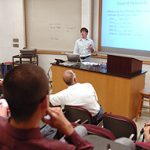Students and faculty from three Triad colleges gathered at Elon July 6 as part of a summer chemistry research program funded by the National Science Foundation. Details...
 Elon hosted the visit to campus by researchers from Guilford College, North Carolina A&T State University and the University of North Carolina at Greensboro. The visit included a tour of Elon’s McMichael Science Center facilities and presentations by students on their research projects.
Elon hosted the visit to campus by researchers from Guilford College, North Carolina A&T State University and the University of North Carolina at Greensboro. The visit included a tour of Elon’s McMichael Science Center facilities and presentations by students on their research projects.
Click here to read the story in the Greensboro News & Record.
Two Elon University chemistry faculty members are participating in the pilot program funded by the NSF. The program is designed to engage high school or early college students in chemistry research early in their undergraduate careers.
Eugene Grimley, T. E. Powell Professor of Chemistry, and Joel Karty, assistant professor of chemistry are working with Elon sophomore Austin Toman and Tyler Anderson, a senior at Western Alamance High School on the research projects. Faculty-student teams are also conducting research at the other three schools. Students were selected for the program based on their academic records, chemistry experience and desire to pursue majors in science.
Over the course of 10 weeks, the students are gaining an in-depth appreciation for the field of chemistry, learning how to ask original research questions and then go about finding the answers.
Grimley and Anderson are synthesizing and studying two compounds that can only be produced at -70 degrees Celsius. They will characterize the compounds, documenting the physical properties using nuclear magnetic resonance spectroscopy.
“These students are enjoying the opportunity to use their science knowledge in a college-level lab setting with sophisticated instruments,” Grimley says. “This will give them a head start on starting a major in chemistry or some other field of science.”
Karty and Toman are studying spatial patterns that form in a type of chemical reaction called periodic precipitation. These particular reactions have been studied for more than 100 years, and have been linked to human cysts, tumors and gall stones, and have also been linked to patterns that appear in certain geologic formations. Over the years, several theories have been developed, but none have been fully corroborated experimentally, leaving such phenomena poorly understood.
“One of the focuses of this program is to get students started on undergraduate research as soon as possible,” Karty says. “We want to expose them early to the excitement that comes with it. With that excitement, students see the importance of learning the material we teach in the formal classroom setting and are more motivated to learn.”
The $50,000 NSF grant is titled, “Expanding the Greater Greensboro Consortium: Building a Research Community by Early Recruitment and Research Immersion.” In addition to funding the summer research projects, the grant also funds planning for the formation of an Undergraduate Research Center by the members of the Greater Greensboro Chemistry Consortium: Elon University, Guilford College, UNC-Greensboro, North Carolina A&T State Universitiy, Bennett College, Greensboro College, High Point University, Guilford Technical Community College and Alamance Community College.


